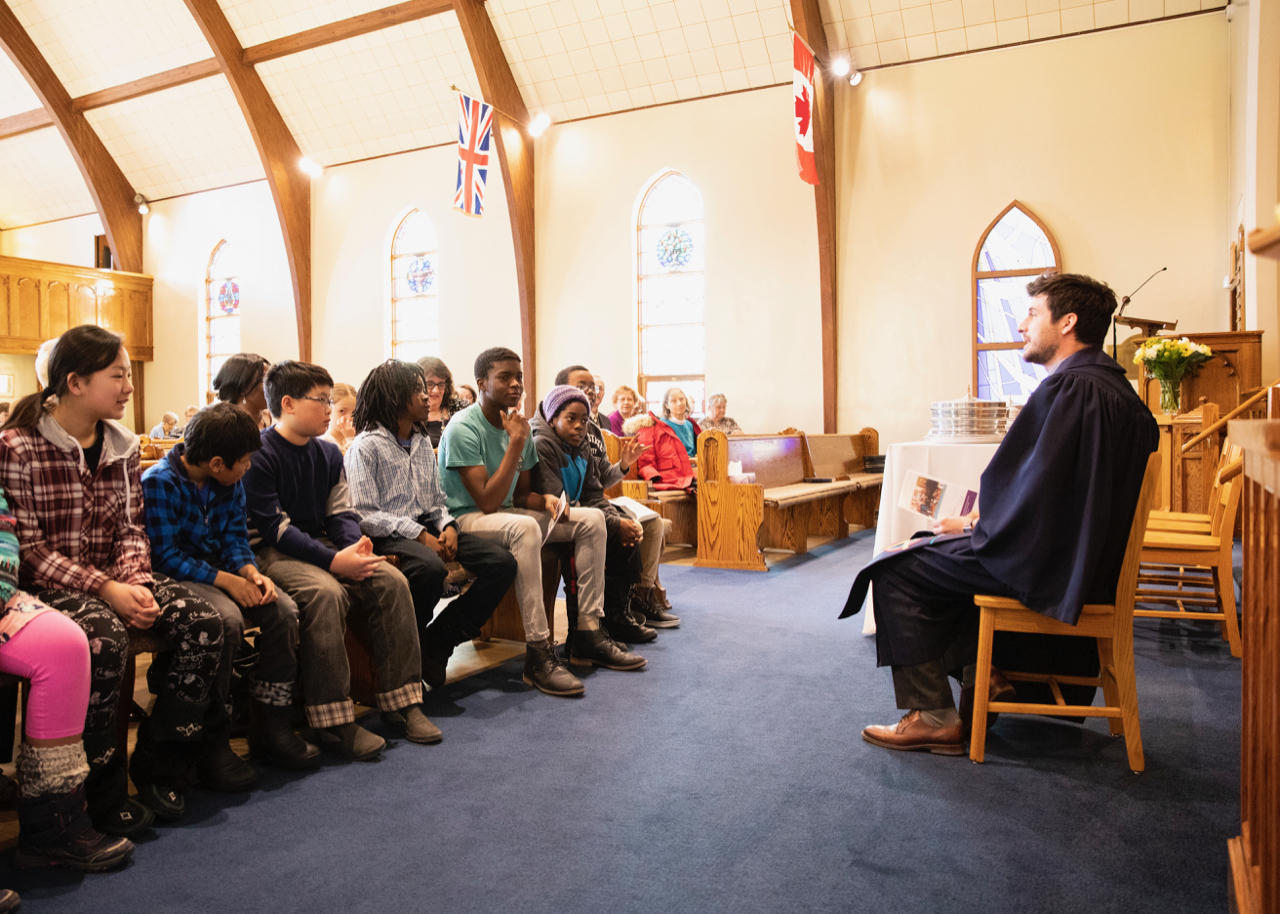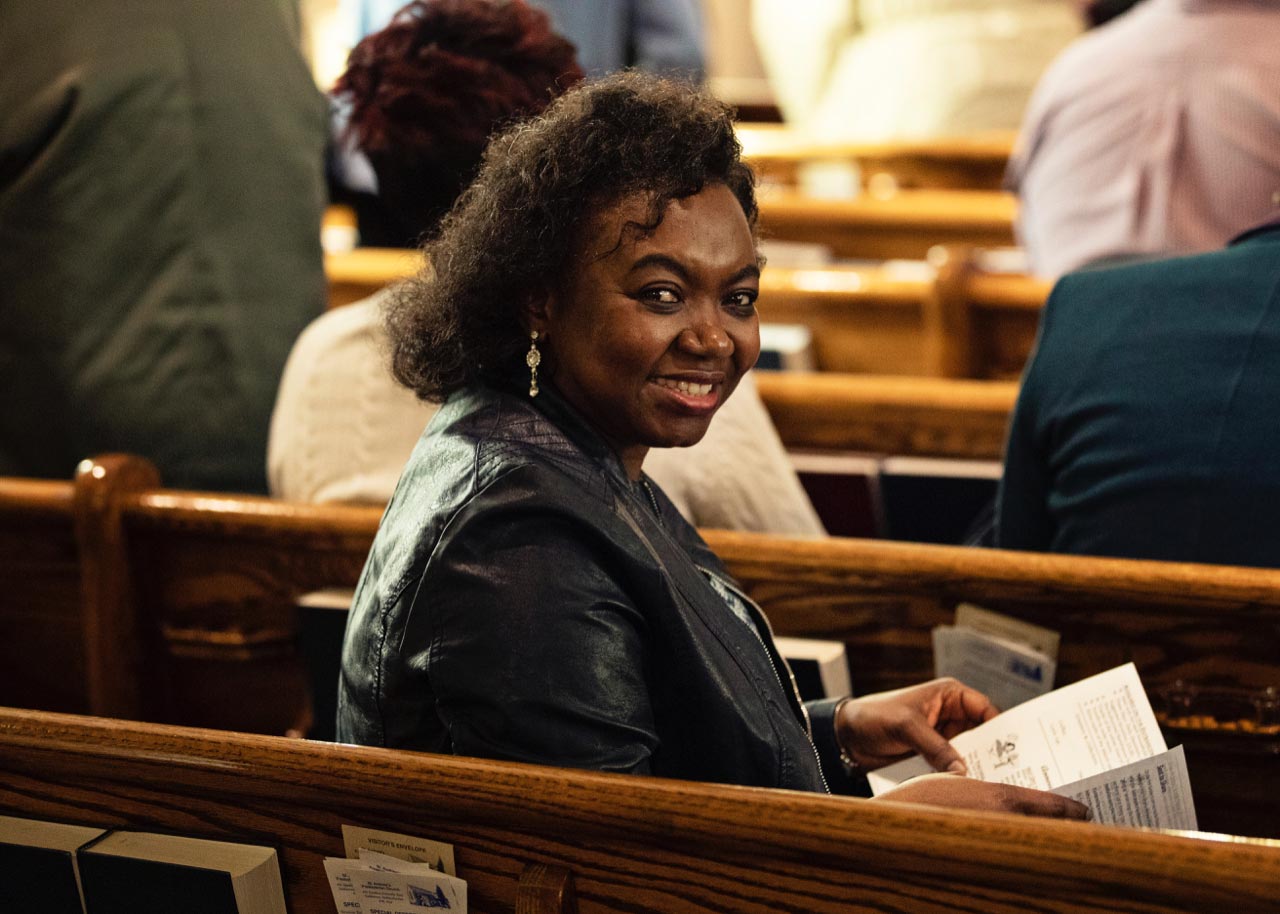Come and worship at St. Andrew’s with friendly Presbyterians, Sundays at 11 AM!
Watch our weekly service online
We worship live on our YouTube channel each Sunday at 11AM. The video on this page is a recording of last week’s service.To watch live on Sunday, click here.
Stay for coffee, tea, juice, cookies and conversation after worship each Sunday. Volunteers provide the snacks and we all gather in the lower hall for a time of meeting new and old friends.
There is an elevator available for anyone needing to use it. Access is via the parking lot door with the ramp. From there, the elevator will take you up to the sanctuary for worship or down to the lower hall for coffee.
Sunday school
Children age three to Grade 8 are invited to attend St. Andrew’s Church School on Sunday mornings. We all worship together at 11 AM and then the children go downstairs for their classes after the Children’s Story. Our dedicated Church School teachers use the “Feasting on the Word” curriculum to teach biblical stories and apply them to the everyday life of the children. About eight times each year, we have “Family Worship” in which children and adults worship together for the whole worship service. These services include special activities for the children.
Parents with younger children are welcome to bring their children to worship. We also have a nursery available for your convenience with a radio broadcasting the worship service.

Service
- Musical Prelude: Our organist/pianist offers a musical prelude as we gather for worship.
- Welcome and Announcements: The choir and minister enter the sanctuary and the minister greets the people. The minister welcomes the congregation and makes any announcements that are necessary. Announcements are also printed in the bulletin for people to take home.
Gather in God’s name
- Call to Worship: Our first act of public worship is to heed God’s call and to join with others in praising God. The words used to call us to worship are often from Scripture and remind us that worship centres on God and not on ourselves.
- Prayer of Approach: We approach God in prayer, acknowledging God’s holiness and offering our love and devotion. We ask God to be present with us by the Holy Spirit as we seek to worship God alone.
- Praise: We sing a hymn or song of praise, usually from the 1997 edition of The Book of Praise, the hymnal of the Presbyterian Church in Canada.
- Prayer of Confession: We confess our sins to God – sometimes the minister prays the prayer, sometimes we have a moment of silence to confess personal sin and sometimes we say a prayer together that is printed in the bulletin.
- Assurance of God’s Love and Grace: This is the proclamation of God’s faithfulness, usually spoken by the minister. We celebrate God’s glorious love and forgiveness in Jesus Christ – “Friends, believe the gospel: in Jesus Christ, we are forgiven!”

Proclaim God’s Word
- Good News for our Children and the Lord’s Prayer: We begin to proclaim God’s Word through a message prepared for the children. The children are invited to come forward and sit in the front pews so that they can see and hear what is happening. The Good News for the Children is usually a story or lesson based on one of the Scripture readings of the day. Though the children are the ones interacting directly with the minister at this time, people of all ages may hear the gospel through this proclamation. We close this time by saying the Lord’s Prayer together. We call this our “family prayer” – as one family in Christ, we pray the family prayer of the people of God.
- Praise: We sing praise to God in response to the Good News that we have heard. This song is usually one that is particularly familiar or appropriate for the children.
- Prayer for Illumination: This prayer asks the Holy Spirit to bring light to help us understand what God is saying to the church today.
- Scripture Lessons: Sometimes the minister reads from the Bible but members of the congregation also take turns to proclaim the readings. The psalm is usually led by a choir member. He or she leads the singing of a short refrain from The Book of Psalms and then the congregation reads the psalm responsively.
- Sermon: The minister delivers a sermon – an interpretation or application of one or more of the Scripture readings.
Give thanks to God
- Gathering of the Offering: Offering plates are passed around the congregation so that people can make money offerings in thanks to God and for the glory of God. Donations are not required to attend the service. If you would like to make an offering, it supports the ministry at St. Andrew’s, the ministry of the Presbyterian Church in Canada (through Presbyterians Sharing) and International Ministry (through Presbyterian World Service and Development). Individuals may designate which ministries or missions their offerings are to go towards.
- Choir Anthem, Solo, or Special Music: During the Gathering of the Offering (or sometimes at another time during the worship) the choir makes a special musical offering. Our choir director tries to choose music that proclaims the same message or theme as the Scripture readings of the day.
- Doxology and Prayer of Thanksgiving/Dedication: We sing praise to God (doxology) as the offerings are presented at the front of the church. Then the minister offers a prayer of thanksgiving to God for the gifts that we are able to share and asks God to bless and use the gifts for God’s glory and for building up God’s kingdom on earth.
- Prayers of the People: We pray for the needs of the church, the world, and those in need, trusting in God’s grace and mercy.

The Word Made Visible
- Praise: We sing a final hymn of praise to God as we prepare to be sent by God into the world to continue to follow Jesus and worship God throughout the week.
- Benediction and Choral Amen: The minister “commissions” the people to go out into the world to love and serve the Lord. Then he offers a benediction (blessing) and the people respond by singing: “Amen, amen, amen.”
- Musical Postlude: The organist/pianist offers a musical postlude as the congregation prepares to leave the worship space.
Sacrament of Holy Communion
We celebrate the Sacrament of Holy Communion six times per year on Sunday mornings as well as at our Chapel Communion service which happens the following week after morning worship. We observe Communion in the Reformed tradition, with these elements:
- Invitation to the Table: Since Christ is the host at the meal, Presbyterians believe that the table is open to all who have been baptized – the whole family of God. The minister declares Christ’s invitation to everyone to receive the Sacrament.
- The Apostles’ Creed: We stand to confess our faith in Christ, usually using the words of the ancient “Apostles’ Creed.”
- Praise: We sing a hymn or song about the Sacrament of Holy Communion as we prepare to celebrate the Sacrament.
- Great Prayer of Thanksgiving: This prayer, based on an ancient Christian prayer, includes spoken and sung responses for the congregation, which are printed in the bulletin. The prayer opens with thanksgiving to God and we join with the whole creation in lifting our hearts in joyful praise. Thanksgiving continues for the work of Jesus Christ, and we proclaim the mystery of faith: “Christ has died. Christ is risen. Christ will come again.” The presence of the Holy Spirit is invoked, followed by a doxology.
- Breaking of the Bread and Sharing of the Cup: The minister tells the story of Jesus’ last supper with his disciples. We remember how Jesus broke the bread and passed the pieces among his friends, saying, “This is my body, given for you.” Then he shared a cup of wine, saying, “This cup is the new covenant, sealed in my blood. Every time you eat this bread and drink this cup, remember me.” The elders distribute the bread and juice to the congregation. Usually, the congregation remains seated and they are served in their pews.
- Prayer after Communion: When all have finished eating and drinking, we join in prayer together, giving thanks to God for the gift we have received.

